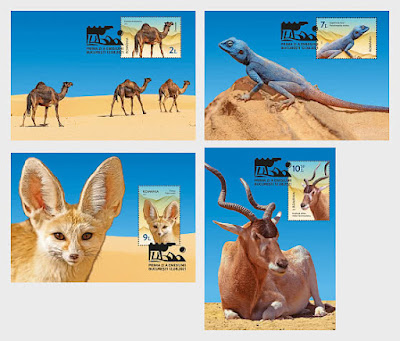1982) Desert Fauna, Romania: Romfilatelia (Romanian Post) has issued a set of four Postage Stamps featuring the Dromedary (Camelus dromedarius), Sinai Agama (Pseudotrapelus sinaitus), Fennec Fox (Vulpes zerda) & Addax Antelope (Addax nasomaculatus): Date of Stamp Set issue: 12.08.2021:
About Desert Fauna:
Deserts occupy about a third of the land area and are characterized by a very low level of precipitation.
Not all deserts are found in the hot regions of the planet; there are also cold deserts, as some regions of the Arctic and Antarctic are considered to be.
The largest hot desert in the world is the Sahara (in Africa). In contrast, the Gobi Desert in Asia is generally a cold desert, where temperatures can drop below -20 degrees Celsius in winter.
In deserts, aridity creates harsh living conditions for living things, and they have special adaptations to survive.
The four stamps and the First Day Cover illustrate animal species living in the desert areas of Africa and Asia:
The Sinai agama (Pseudotrapelus sinaitus) is represented on the stamp with the face value of Lei 7.00.
It is a small reptile, up to 18 cm, that lives in arid areas of north-eastern Africa and southwest Asia.
The fennec fox (Vulpes zerda) is represented on the stamp with the face value of Lei 9.00.
It is a species of fox that lives in the Sahara, the Sinai Peninsula and the Arava and Negev deserts of Israel. It is the smallest species in the canid family (which includes foxes, dogs, wolves, jackals, etc.).
The addax antelope (Addax nasomaculatus) is illustrated on the stamp with the face value of Lei 10.50.
It is a species native to the Sahara, very well adapted to the conditions of life in the desert. It can survive for a long time without drinking water, obtaining the necessary water from dew and the plants it feeds on. Once widespread in North Africa, the addax antelope is now a critically endangered species, a large number of specimens being bred in captivity.
The First Day Cover (FDC) of the issue, at left, depicts the Bactrian camel (Camelus bactrianus), also known as the “two-humped camel”, native to the steppe and desert areas of Central Asia. Adapted to the difficult conditions in this region, it withstands water shortages and very large temperature variations. Most of the population consists of domestic animals, with a smaller number of wild specimens in Asia and Australia.
The four stamps issued in the set are affixed at the top cancelled with a special Handstamp/Postmark showing the camel in the centre.
The Cancellation is of Bucharest Post Office and is dated - "12.08.2021".
The Maxi Cards - A Maxi Card has all three elements - the photo/picture, cancellation and the stamp on the same face.
The Sheetlets of six Stamps each.
The Full Sheets (FS) of 32 Stamps each.
Technical details:
Stamp Set Issue Date: 12.08.2021
Designer: George Ursachi
Process: Offset
Colours: 4 Colours
Size: 33.00 mm x 48.00 mm; 48.00 mm x 33.00 mm
Stamp Values: 2 L, 7 L, 9 L and 10.5 L
17) Institute of Speleology (Study of Caves) "Emil Racovita", Romania: A Century of Research (1920-2020): A set of four stamps issued by Romfilatelia (Romanian Post) featuring representative images of Caves of Romania which are of great importance for Speleological Research & Activity: Date of Stamp set issue: 18.06.2020





Vikram Bhatnagar has commented:
ReplyDelete"A desert saying is "it's either you or the Wolf!"
Due to lack of food, desert Wolves are doubly ferocious and known to stalk their prey (humans too qualify), for long periods, day and night, waiting for an opportune moment to strike and overpower! The prey has to be tired, famished and weakened to be fit for being attacked!
The analogy applies to human interactions in such arid areas as well and, even in urban white collarred jobs, one needs to be extremely careful and alert of fellow workers, bosses, subordinates etc. for, which of them might turn into a Fox and when, is unknown! 😳"
Thanks for sharing this interesting insight, Vikram.
DeleteSantosh Khanna has commented:
ReplyDelete"Great post! Thank you for posting this."
Thank you, Khanna sahab.
DeleteRsanker Sharma has commented:
ReplyDelete"Thank you for the information."
Thank you, Sharma sahab.
Delete